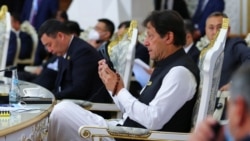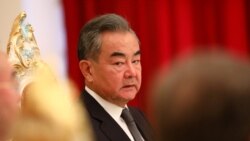China and Pakistan expect the Taliban to fulfill pledges to crack down on foreign extremist groups in Afghanistan, but experts say these groups have already been "energized" by the Taliban’s takeover, posing new challenges for Pakistani and Chinese interests.
Last week, during the 20th Shanghai Cooperation Conference summit, President Xi Jinping of China and Prime Minister Imran Khan of Pakistan both called on the international community to engage with the Taliban and called on the Taliban to fulfill their pledges to clamp down on terrorist groups.
The Taliban have said that they will not allow any group to use Afghan soil against any country, without laying out specifics. Some experts say the group’s swift takeover of Kabul has already emboldened extremist groups in the region and regional countries should expect more insecurity, not less.
“There is no evidence that the Taliban will clamp down on these groups,” said Aqil Shah, professor of South Asian Studies at the University of Oklahoma and non-resident scholar at the Carnegie Endowment for International Peace, adding that the problem with the Taliban is that “they say one thing and they do quite the opposite.”
Shah said the Taliban’s takeover of Afghanistan leading up to the capture of Kabul was “a morale booster” for the terrorist groups, particularly those based in Afghanistan.
There are approximately 8,000 to 10,000 “foreign terrorist fighters” in Afghanistan, including people from “Central Asia, the north Caucasus region of the Russian Federation, Pakistan and the Xinjiang Uighur Autonomous Region of China” according to a U.N. report released in June 2021.
A July 2020 U.N. report stated 6,000 to 6,500 of the foreign fighters in Afghanistan are from Pakistan, and majority of these militants are affiliated with Tehrik-i-Taliban Pakistan (TTP), a U.S.-designated terror group that has mostly carried out attacks against Pakistani security forces.
Threat to Pakistan
The TTP, which pledges allegiance to the Taliban in Afghanistan, has increased its attacks in Pakistan in recent weeks.
The group killed seven Pakistani soldiers in a gunfight in South Waziristan, a district in northwest Pakistan near the Afghanistan border on September 15.
The TTP also claimed responsibility for a suicide attack in Quetta, the capital of Pakistan’s southwestern Baluchistan province, on September 5 that killed at least three Pakistani soldiers.
Shah added that the TTP is “the main threat” to Pakistan’s security as it intends “to destabilize Pakistan” and eventually “overthrow the government in Pakistan.”
Pakistani officials said the TTP is planning attacks from Afghanistan, and they expect the Taliban to make good on pledges to prevent the group from using Afghan soil to attack Pakistani security forces. But there is little public information so far to indicate that any kind of Taliban crackdown against the group is imminent.
Abdul Basit, a research fellow at Nanyang Technological University’s International Center for Political Violence and Terrorism Research in Singapore, predicts the TTP will continue its attacks.
“For TTP, it is the same. If you can defeat the US, certainly you can defeat the Pakistani army,” added Basit.
Pakistani officials blamed TTP militants for a suicide bomb attack on a bus last month that killed 13 people, including nine Chinese workers who were headed to a dam construction project in the north of the country.
Far from promising a crackdown on the TTP, Pakistani officials have made more conciliatory gestures. On September 15, Pakistan’s Foreign Minister Shah Mahmood Qureshi said Islamabad is ready to pardon those members of the TTP who promise not to get involved in terrorist activities which the group rejected. He indicated he hoped the Taliban helps convince TTP members to submit to the Pakistani constitution and drop their armed insurgency.
Qureshi said he remained concerned over reports that hundreds of TTP fighters were released from Afghan prisons as the Taliban took control of the country.
Basit said the Taliban’s takeover in Afghanistan will further increase “radicalism” in the region, and “as a result, the recruitment for the groups would increase.”
He added the TTP has close relations with other extremist groups, including East Turkistan Islamic Movement (ETIM). “TTP provided them refuge. They lived together. They fought together.”
ETIM, the East Turkistan Islamic Movement, is a Uighur separatist group that China calls “the most dangerous and extremist terrorist group” in its Xinjiang region. However although ETIM remains a U.N.-designated terrorist group with several hundred fighters reportedly located in Afghanistan’s Badakhshan province, the U.S. removed the group from its terror list in 2020, citing “no credible evidence” that it continued to exist.
Threat to China
China now faces multiple threats from the region with America’s complete withdrawal from Afghanistan, Basit said.
“The Americans only fought the jihadists in the region. For China, it’s a double blow, because not only the Jihadists, (but) the ethno-nationalists are also against China.” Basit added, “these (terrorist) groups need a big enemy to justify their violence. For the last 20 years, the enemy was the U.S. forces. Now the next big villain is China.”
The Baloch National Freedom Movement, a terrorist organization that seeks the independence of Balochistan province in southwest Pakistan, has made it clear that China is their target. In August 2020, the Baloch National Freedom Movement announced an alliance with the Sindhu Desh Liberation Army, a terrorist organization based in Pakistan’s Sindh province. Together, the two accused China of expansionism and occupying local resources in the region.
While terrorist attacks inside China remain unlikely because of the tight security there, said Basit, the Chinese Pakistan Economic Corridor (CPEC) project in Pakistan is “China’s soft underbelly and (a) good opportunity for these (militant) groups to target and (pressure) China to amend its behavior (toward the) Xinjiang Muslim community. Otherwise, attacks would continue.”
CPEC is a series of infrastructure projects including highways and ports. Prime Minister Khan describes CPEC as the “flagship project” of China’s Belt and Road Initiative, which aims to expand China’s political and economic influence to Europe.
China hopes the Taliban will prevent the infiltration of ETIM militants into Xinjiang. That scenario is considered “a major threat” for China, said Huping Ling, history professor at Truman State University and visiting fellow of the Hoover Institute at Stanford University.
China and Afghanistan may only share a 75-km border, which is undeveloped and largely impassable during winter months, but Ling said the country has invested resources in securing the border.
“For China, it is strategically important to secure the border because that is one of the headaches regarding maintaining the stability,” Ling added.
She said the Taliban is looking to China to build up infrastructure in Afghanistan to extract an estimated $1 trillion to $3 trillion worth of minerals there. “It will be beneficial to both China and the Taliban’s government.”
The Taliban has repeatedly stated they want close relations with China, particularly as Afghanistan is on the verge of economic collapse since the international community has frozen donors’ funds and billions of dollars in assets.
“China is our main partner and represents a fundamental and extraordinary opportunity for us because it is ready to invest and rebuild our country,” Taliban spokesperson, Zabiullah Mujahid told the Italian newspaper La Repubblica on September 2.
Washington says China’s crackdown against ethnic Uighurs amount to a genocide against the majority Muslim group, but so far those repressive policies appear to have had little impact on the Taliban’s view of Beijing.
“They (Taliban) are so anxious to have political and economic assistance from China that they are forgetting the fact that China is one of the greatest abusers of Islamic population on the globe,” said Marvin Weinbaum, the director of the Afghanistan and Pakistan Program at the Washington-based Middle East Institute.
“This suggests that when it comes to the practical politics of governing, ideology takes the back seat,” said Weinbaum.
Human rights organizations accuse Beijing of committing crimes against humanity by arbitrarily detaining more than 1 million Uighurs and other Muslims in internment camps and forcing others into forced labor.






